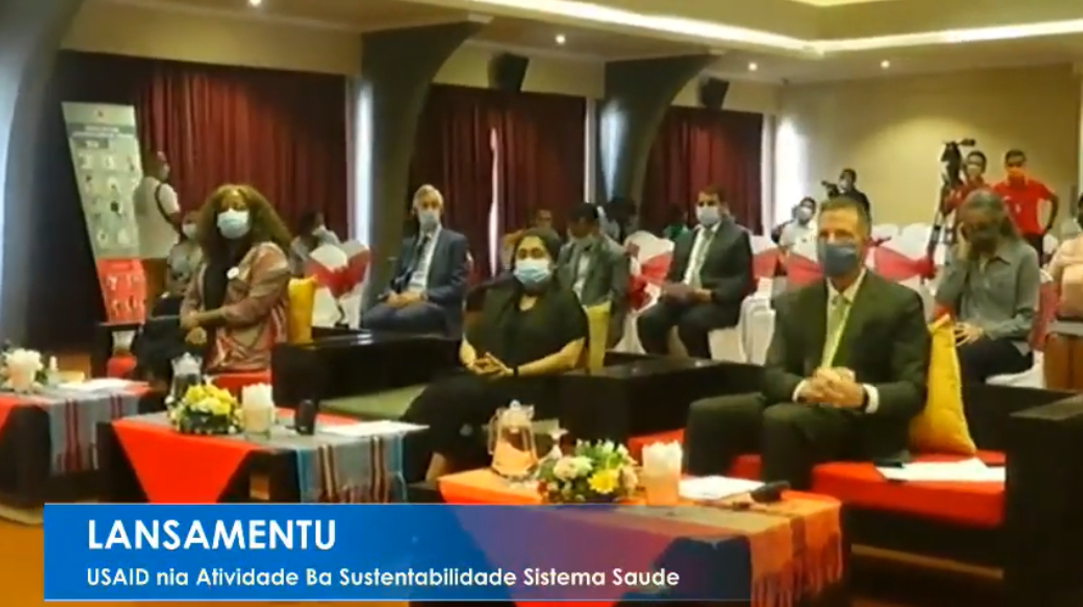Four-Year USAID Health System Sustainability Activity Gets Underway in Timor-Leste
Subtitle
Collaboration with government aims for better health for Timorese citizens
Date

The people of Timor-Leste will gain increased access to affordable, high-quality health services under a new LHSS Project activity launched this summer. Representatives of USAID and the government of Timor-Leste celebrated the start of the four-year, $15.6 million activity at a ceremony in Dili, the Timor-Leste capital, on July 2, 2021.
“Strong health systems are essential as the country prepares for and copes with pandemics and other health challenges,” said U.S. Ambassador Kevin Blackstone at the event. "We are pleased to partner with the government and people of Timor-Leste to design rigorous, data-driven systems that will help ensure good health for future generations of Timorese.”
The LHSS activity, which in Timor-Leste is known as the USAID Health System Sustainability Activity, will collaborate with the Timor-Leste government to strengthen its ability to finance, govern, and deliver high-quality and affordable essential health services. The activity will emphasize responsiveness and accountability to health care users and will work to increase civil society engagement.
Since its independence in 2002, Timor-Leste has made important strides in improving health and well-being. Fewer women die in childbirth, more children receive life-saving vaccines, and Timorese people live healthier lives. The COVID-19 pandemic has brought unprecedented challenges, however, threatening this steady progress.
Ambassador Blackstone and Timor-Leste Minister of Health Odete Maria Belo agreed that an effective, resilient health system is more important than ever. “It is most important for [the] Minister of Health to engage with USAID to promote the Timor-Leste Health System Sustainability activity, to guarantee strong health system essentials as the country prepares to cope with pandemics,” said Her Excellency Belo.
In keeping with the LHSS Project’s overall approach to country activities, local stakeholders were consulted during the design phase of the activity in Timor-Leste. The activity’s objectives and interventions reflect input from the Ministry of Health, the National Institute of Health, and the Commission for Recruitment and Career Development, among many others.
The activity will collaborate with the government in the following areas:
Health Sector Governance
Strengthening health sector governance is the first step to improving Timor-Leste’s collective health. The activity will support the government’s ability to engage in evidence-based decision-making, strengthen coordination between government agencies, and improve health financing processes at the national and subnational levels.
Health Sector Workforce Management
In recent years, the government has worked to increase the number of trained health care professionals in Timor-Leste, and has created a national strategic plan to address health sector workforce management. The activity will build on this progress by supporting the government’s efforts to recruit and retain a qualified workforce, distribute health workers adequately across the country, develop job competencies and standards, and increase opportunities for training and professional development.
Healthy Behaviors
While Timor-Leste has made impressive progress in improving health outcomes – for example, by reducing the maternal mortality rate and reducing the total fertility rate – more remains to be done. The activity will increase healthy behaviors across the population through a social and behavior change approach that includes community participation and partnerships with civil society.
Civic Engagement and Advocacy
The activity recognizes the importance of civic engagement and advocacy in the health system and will partner with civil society organizations and the government. These partnerships will encourage strong civic engagement in priority setting, monitoring, and accountability for health services.
The Timor-Leste launch event was live-streamed on national TV through the country’s social media platforms and globally through the LHSS Project YouTube channel.
